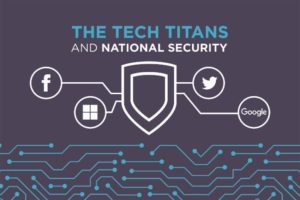300 New Jersey Avenue NW
Washington, DC
June 28, 2018 | 9:30 AM – 1:30 PM

This National Security Symposium was sponsored by the National Security Institute at George Mason University’s Antonin Scalia Law School and the Federalist Society’s International & National Security Law Practice Group.
The leading technology and Internet-based companies are dominant forces in the economic and cultural development of the era. They also have a vital role to play in cybersecurity and national security. This Symposium brought together a range of people at the vital center of developing rules and parameters on these issues to debate and discuss how we might succeed in this area.
Panel I — The Tech Titans’ Role in Cybersecurity. This panel focused on the questions of what measures major companies can take, individually or collectively, to prevent, detect, mitigate and halt imminent or in-progress cyberattacks, such as the WannaCry attack, which spread around the globe, infecting over 200,000 computers in more than 150 countries. What else can they do to enhance collective cybersecurity? What resources are available to them? What other resources are needed? What legal protections are necessary and appropriate? Panelists Included:
David Lieber, Senior Privacy Policy Counsel, Google
Dr. Andrea Little Limbago, Chief Social Scientist, Endgame; Visiting Fellow, National Security Law & Policy Program, Antonin Scalia Law School, George Mason University
Angela McKay, Senior Director, Cybersecurity Policy and Strategy, Microsoft
Moderator: Prof. Jamil N. Jaffer, Adjunct Professor, NSI Founder
Panel 2 — The Tech Titans’ Duties to Assist the Government. It is difficult to imagine any criminal acts, espionage, or terrorism that does not leave some form of cyber fingerprints. As corporate citizens, to what extent can and should the companies cooperate in supporting criminal, intelligence, and counterintelligence operations? What should their duties be, if any, to combat information warfare conducted by foreign governments or terrorist organizations? What incentives can be created to encourage them? What are the challenges to working collaboratively with the government on these issues? Are compliance regimes necessary and, if not, how should we ensure that companies and the government are able to work together effectively on such issues? Panelists Included:
Craig Albright, Vice President, Legislative Strategy, BSA
The Honorable Stewart Baker, Advisory Board Member, NSI and former General Counsel, NSA
The Honorable Mark Champoux, Principal Deputy Assistant Attorney General, Office of Policy, U.S. Department of Justice
The Honorable F. Scott Keiff, former Commissioner, U.S. International Trade Commission
David Kris, Advisor, Intellectual Ventures
Moderator: Matthew R. A. Heiman, Visiting Fellow, National Security Institute, Antonin Scalia Law School, George Mason University
There will be a keynote presented by the Honorable Kenneth L. Wainstein, Partner, Davis Polk & Wardwell LLP during the Lunch hour.
Schedule:
Panel I
Panel II
Luncheon Address
